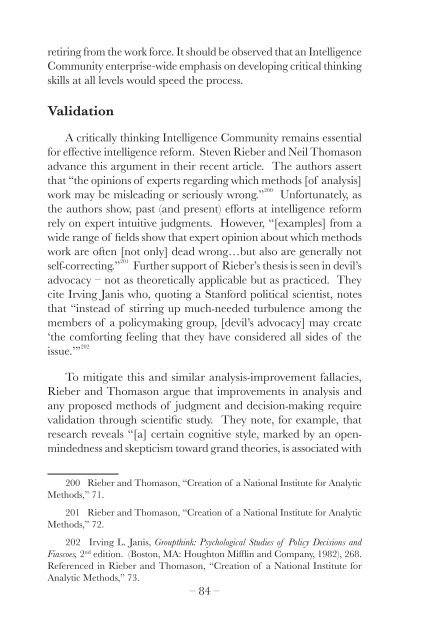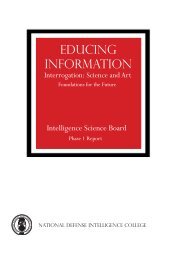Critical Thinking and Intelligence Analysis
Critical Thinking and Intelligence Analysis
Critical Thinking and Intelligence Analysis
Create successful ePaper yourself
Turn your PDF publications into a flip-book with our unique Google optimized e-Paper software.
etiring from the work force. It should be observed that an <strong>Intelligence</strong><br />
Community enterprise-wide emphasis on developing critical thinking<br />
skills at all levels would speed the process.<br />
Validation<br />
A critically thinking <strong>Intelligence</strong> Community remains essential<br />
for effective intelligence reform. Steven Rieber <strong>and</strong> Neil Thomason<br />
advance this argument in their recent article. The authors assert<br />
that “the opinions of experts regarding which methods [of analysis]<br />
work may be misleading or seriously wrong.” 200<br />
Unfortunately, as<br />
the authors show, past (<strong>and</strong> present) efforts at intelligence reform<br />
rely on expert intuitive judgments. However, “[examples] from a<br />
wide range of fields show that expert opinion about which methods<br />
work are often [not only] dead wrong…but also are generally not<br />
self-correcting.” 201<br />
Further support of Rieber’s thesis is seen in devil’s<br />
advocacy – not as theoretically applicable but as practiced. They<br />
cite Irving Janis who, quoting a Stanford political scientist, notes<br />
that “instead of stirring up much-needed turbulence among the<br />
members of a policymaking group, [devil’s advocacy] may create<br />
‘the comforting feeling that they have considered all sides of the<br />
issue.’” 202<br />
To mitigate this <strong>and</strong> similar analysis-improvement fallacies,<br />
Rieber <strong>and</strong> Thomason argue that improvements in analysis <strong>and</strong><br />
any proposed methods of judgment <strong>and</strong> decision-making require<br />
validation through scientific study. They note, for example, that<br />
research reveals “[a] certain cognitive style, marked by an openmindedness<br />
<strong>and</strong> skepticism toward gr<strong>and</strong> theories, is associated with<br />
200 Rieber <strong>and</strong> Thomason, “Creation of a National Institute for Analytic<br />
Methods,” 71.<br />
201 Rieber <strong>and</strong> Thomason, “Creation of a National Institute for Analytic<br />
Methods,” 72.<br />
202 Irving L. Janis, Groupthink: Psychological Studies of Policy Decisions <strong>and</strong><br />
Fiascoes, 2 nd edition. (Boston, MA: Houghton Mifflin <strong>and</strong> Company, 1982), 268.<br />
Referenced in Rieber <strong>and</strong> Thomason, “Creation of a National Institute for<br />
Analytic Methods,” 73.<br />
– 84 –
















